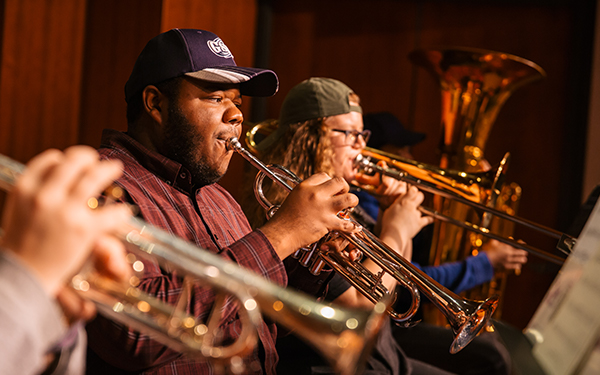As established by the Georgia Professional Standards Commission and the National Association of Schools of Music, the Music w/ Teacher Certification Program is committed to the following goals:
Performance
- Programs shall prepare candidates who possess technical skills requisite for artistic self-expression in at least one major performance area at a level appropriate for the particular music concentration. Programs shall prepare candidates who possess an overview understanding of the repertory in their major performance area and the ability to perform from a cross section of that repertory.
- Programs shall prepare candidates who possess the ability to read at sight with fluency.
- Programs shall prepare candidates who possess knowledge and skills sufficient to work as a leader and in collaboration on matters of musical interpretation. Rehearsal and conducting skills are required as appropriate to the particular music concentration.
- Programs shall prepare candidates who possess keyboard competency. Experiences in secondary performance areas are recommended.
- Programs shall prepare candidates who possess growth in artistry, technical skills, collaborative competence and knowledge of repertory through regular ensemble experiences. Ensembles should be varied both in size and nature.
Aural Skills and Analysis
- Programs shall prepare candidates who possess an understanding of the common elements and organizational patterns of music and their interactions, and the ability to employ this understanding in aural, verbal, and visual analysis.
- Programs shall prepare candidates who possess sufficient understanding of musical forms, processes, and structures to use this knowledge in compositional, performance, scholarly, pedagogical, and historical contexts, according to the requisites of their specializations.
- Programs shall prepare candidates who possess the ability to place music in historical, cultural, and stylistic contexts.
Composition and Improvisation
- Programs shall prepare candidates who possess rudimentary capacity to create derivative or original music both extemporaneously and in written form.
- Programs shall prepare candidates who possess the ability to compose, improvise, or both at a basic level in one or more musical languages, for example, the imitation of various musical styles, improvisation on pre-existing materials, the creation of original compositions, experimentation with various sound sources, and manipulating the common elements in non-traditional ways.
History and Repertory
- Programs shall prepare candidates who possess a basic knowledge of music history through the present time.
- Programs shall prepare candidates who possess an acquaintance with repertories beyond the area of specialization. All students must be exposed to a large and varied body of music through study and attendance at recitals, concerts, opera and musical theater productions, and other performances.
Technology
- Programs shall prepare candidates who possess a basic overview understanding of how technology serves the field of music as a whole.
- Programs shall prepare candidates who possess a working knowledge of the technological developments applicable to their area of specialization.
Synthesis
- Programs shall prepare candidates who work independently on a variety of music problems by combining their capabilities in performance; aural, verbal and visual analysis; composition and improvisation; and repertory and history.
- Programs shall prepare candidates who form and define value judgments about music.
- Programs shall prepare candidates who demonstrate the tools to work with a comprehensive repertory, including music from various cultures of the world and music of their own time.
- Programs shall prepare candidates who understand basic interrelationships and interdependencies among various professions and activities that constitute the music enterprise.
Music Competencies for Teachers
- Programs shall prepare candidates who are competent conductors, able to create accurate and musically expressive performances with various types of performing groups and in general classroom situations.
- Programs shall prepare candidates who are able to arrange and adapt music from a variety of sources to meet the needs and ability levels of school performing groups and classroom situations.
- Programs shall prepare candidates who demonstrate functional performance abilities in keyboard and voice, as well as in instruments appropriate to the student’s teaching specialization.
- Programs shall prepare candidates who demonstrate the ability to apply analytical and historical knowledge to curriculum development, lesson planning, and daily classroom and performance activities.
Teaching Competencies for Teachers
- Programs shall prepare candidates who teach music at various levels to different age groups and in a variety of classroom and ensemble settings in ways that develop knowledge of how music works syntactically as a communication medium and developmentally as an agent of civilization. This competency includes effective classroom and rehearsal management.
- Programs shall prepare candidates who demonstrate an understanding of child growth and development and an understanding of principles of learning as they relate to music.
- Programs shall prepare candidates who demonstrate the ability to assess aptitudes, experiential backgrounds, orientations of individuals and groups of students, and the nature of subject matter, and to plan educational programs to meet assessed needs.
- Programs shall prepare candidates who demonstrate knowledge of current methods, materials, and repertories available in all fields and levels of music education.
- Programs shall prepare candidates who demonstrate the ability to accept, amend, or reject methods and materials based on personal assessment of specific teaching situations.
- Programs shall prepare candidates who demonstrate an understanding of evaluative techniques and ability to apply them in assessing both the musical progress of students and the objectives and procedures of the curriculum.
Resources

